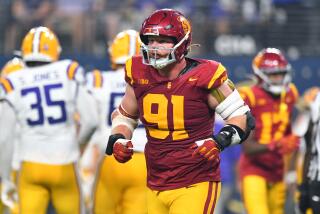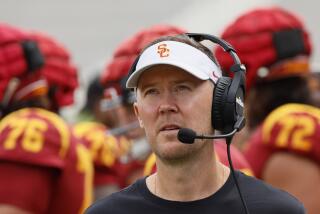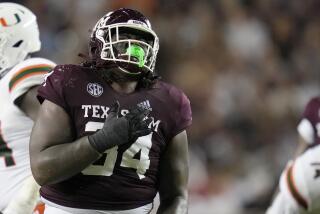NCAA sanctions haven’t slowed USC’s recruiting prowess
Concerns that NCAA sanctions would end USC’s reign as a college football recruiting force were apparently unfounded.
USC Coach Lane Kiffin has already welcomed nine players who enrolled early in January. And on Wednesday, the first day of the NCAA’s signing period for fall sports, USC is expected to sign as many as two dozen more players to cap what will surely be a national top-10 recruiting class.
So what happened to the 15-scholarship limit that was supposed to handcuff the program?
USC is appealing that sanction, along with the back half of a two-year bowl ban, which freezes the penalties until the NCAA’s Infractions Appeals Committee rules to uphold or adjust them. That decision is not expected until February or March.
Meantime, Kiffin and his staff have worked aggressively to build depth before the penalty is implemented. By the time training camp opens in August, USC might have 30 more players than it did at the end of last season.
“This class will probably be the most important class ever signed at USC because of the situation surrounding it,” said Kiffin, who declined to specify how many players he expected to sign Wednesday. “If we were to screw this class up and not get enough guys and take some players that aren’t ‘SC quality, we’d be facing a long dark road.”
A new Football Bowl Subdivision rule caps at 28 the number of players a school can sign to letters of intent or financial aid agreements during the signing period, which runs until May 31. USC’s early enrollees count against its 2010 class, which included 14 players.
Still, any recruiting class larger than 15 would be more than the Trojans were supposed to be able to sign in 2011, 2012 and 2013, according to NCAA sanctions. The penalties also specified that the Trojans would be limited to a 75-player roster in each of those seasons.
Kiffin is aware that he could be perceived as exploiting a loophole. But the Trojans, he said, are working within the rules.
“We are following line by line everything that we’ve been given,” he said. “We’re not doing anything outside that. We’re just maximizing what we’re allowed to do.”
USC officials have noted that Kiffin, recruiting coordinator Ed Orgeron and the rest of the coaching staff are not operating in a vacuum.
“USC is committed to abiding by all NCAA rules and regulations, including any restrictions placed on us as a result of NCAA sanctions,” said J.K. McKay, a senior associate athletic director charged with overseeing football. “The administration and all of our coaching staffs are completely aligned with this policy.”
Speaking generally, NCAA spokesperson Stacey Osburn said that if a penalty were upheld, the appeals committee would designate when that penalty would go into effect.
Should USC not be granted relief, it would be within the NCAA’s power to mandate that the scholarship penalty become effective immediately. However, that scenario is considered highly unlikely because it would put about a dozen players in danger of losing scholarships.
A more probable ruling would be that USC absorb the scholarship penalty in 2012, 2013 and 2014.
Recruiting experts say that no one should be surprised at the strategy adopted by Kiffin and Orgeron, who are regarded among college football’s shrewdest recruiters. Deferring the penalty is not considered a big gamble, especially with coaches under pressure to win now.
“They’re trying to get as many quality kids as possible and gobble them up while they are able to because they might have a tighter leash to work with moving forward,” said Jeremy Crabtree, ESPN.com’s senior coordinator for recruiting.
Allen Wallace, national recruiting editor for Scout.com, said USC’s performance has been “amazing” under the circumstances. Landing quarterbacks Max Wittek of Santa Ana Mater Dei and Cody Kessler of Bakersfield Centennial and addressing the need at offensive line were particularly noteworthy.
“It appears they decided to go whole hog and load themselves up with as much talent as possible,” Wallace said of a class that also could include Crenshaw multipurpose threat De’Anthony Thomas and Gardena Serra receiver George Farmer. “The big gamble would be to take the opposite approach, to not take as many players because of the sanctions.
“If the NCAA is going to send them to their grave, they have to go in as healthy as possible.”
Crabtree said conversations with recruits across the country indicate that USC coaches have made high school players aware of the sanctions and the possible impact.
Wittek and Kessler were undeterred, joining the early enrollees who have been attending classes at USC since early January and will participate in spring practice starting in March.
Farmer, regarded as the nation’s top receiver by several recruiting websites, made an oral commitment to the Trojans in December.
“The sanctions were not that big of a deal to George or to us as parents,” said Farmer’s father, George III, a former NFL player. “They’re going to blow over and you’re still going to be in position to play in bowl games and be good.”
The real test for Kiffin and the Trojans comes in the next few days as players who have made commitments fend off or give in to final sales pitches from other schools.
Linebacker Kent Turene of Florida, who had committed to the Trojans, announced last week that he was reopening his recruitment and would choose among the Trojans, Georgia, Nebraska and Texas Tech.
Thomas, a cornerback and running back regarded as one of the jewels of USC’s class, reportedly visited Oregon last weekend.
Kiffin said last week that he was accustomed to final-hours drama. It’s all part of the process.
“You never know until all the faxes come in,” he said.
twitter.com/latimesklein
More to Read
Go beyond the scoreboard
Get the latest on L.A.'s teams in the daily Sports Report newsletter.
You may occasionally receive promotional content from the Los Angeles Times.







